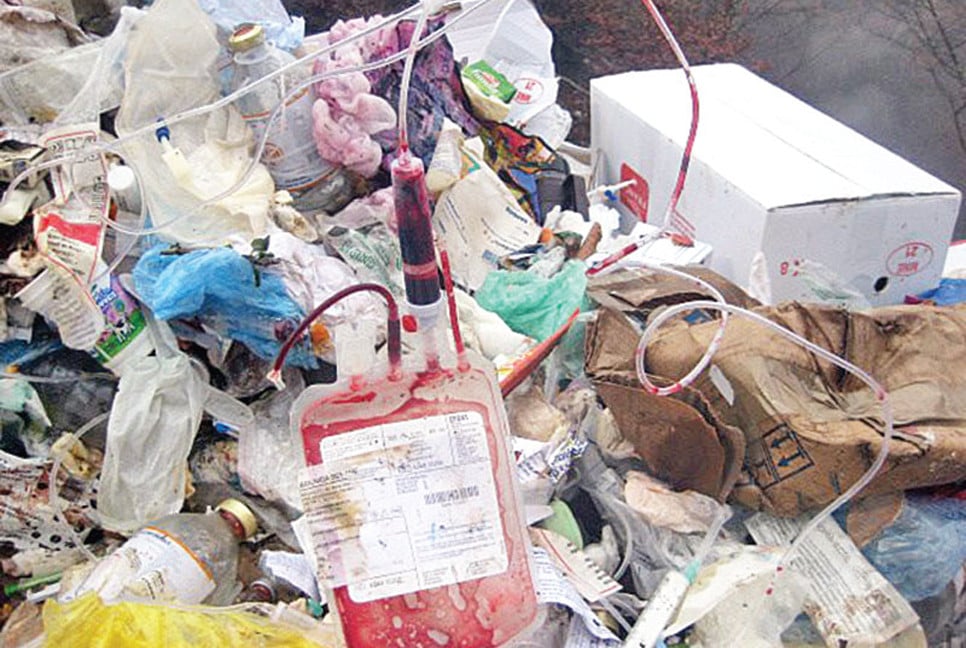Staff Correspondent
Published:2025-07-14 16:51:19 BdST
Toxic medical waste mismanagement puts public health at risk
The mismanagement of toxic medical waste in Bangladesh has reached an alarming level, posing a severe threat to public health and the environment, according to health experts and recent studies.
Despite existing regulations, hospitals, clinics and diagnostic centres across the country continue to dump hazardous waste, such as used syringes, saline bags and body parts, into the open or sell them to scrap dealers, risking the spread of deadly infections like Hepatitis B, HIV and other communicable diseases.
“Improper disposal of medical waste is directly linked to both communicable and non-communicable diseases,” public health expert Dr Lelin Chowdhury said.
“Rotting body parts and sharp objects in the open pollute the environment and spread disease," he added.
Waste piling up, rules ignored
A recent visit to Dhaka Medical College Hospital (DMCH) revealed filthy, waterlogged corridors strewn with used medical waste. Cleaners said about 30 drums of waste are collected daily and sent to Matuail dumping station.
“We sort the waste before sending it,” said Masud, a cleaner at DMCH. “Infections do not concern me much. If I get sick, I will go to the hospital for treatment.”
A 2022 study published on ScienceDirect found that medical waste in Dhaka ranges from 1.63 to 1.99 kg per hospital bed per day – a figure that rose sharply during the COVID-19 pandemic.
A more recent projection by Transparency International Bangladesh (TIB) warns Bangladesh will generate 50,000 tonnes of medical waste in 2025, with over 12,000 tonnes classified as hazardous.
Despite the introduction of the Medical Waste (Management and Treatment) Rules 2008, Solid Waste Management Rules 2021 and the National 3R Strategy, implementation remains weak. Experts say there is no dedicated authority to oversee medical waste nationwide.
Although city corporations and municipalities are responsible for waste management, public-private coordination is poor. As a result, NGOs such as PRISM Bangladesh, Waste Concern and ESDO have taken the lead, especially in urban areas.
Scrap trade thrives
On 21 June, more than ten scrap shops were found operating behind Nalgola Shahi Mosque near Sir Salimullah Medical College Hospital (Mitford Hospital) in Old Dhaka. Large sacks filled with used saline bags, syringes and IV tubes, some bloodstained, were being sorted by bare-handed workers with no safety gear.
Mohammad Shahid, who runs one of these shops, admitted to purchasing used medical items from hospitals.
“We get them from sweepers and even hospital staff,” he said.
TIB found that 31% of hospitals fail to follow waste disposal rules and 49% lack essential equipment like needle destroyers, leaving room for widespread malpractice and the illegal recycling of medical items.
Authorities acknowledge the problem
Dr Mushthaque Hossain, former adviser to the Institute of Epidemiology, Disease Control and Research (IEDCR), emphasised the need for stronger government oversight.
“Private efforts alone will not work. Many hospitals do not even have waste disposal systems, and we are unsure whether collected waste is handled properly,” he said.
Air Commodore Md Mahbubur Rahman Talukder, chief waste management officer of Dhaka South City Corporation, echoed these concerns.
“Some 30-35% of medical waste is not properly collected. Without institutional cooperation, the problem will persist,” he said.
Azizur Rahman Khan, program manager at the Directorate General of Health Services (DGHS), said upazila-level waste is usually segregated and stored in colour-coded bins, with underground pits or incinerators used in many areas.
However, he admitted there are occasional complaints about hospital staff selling waste.
Risks to public health
Experts warn that unsafe medical waste disposal can contaminate food and water sources, contributing to the spread of typhoid, skin infections and even antibiotic-resistant bacteria.
Although Bangladesh’s National Environmental Policy 2018 mandates proper handling of medical waste, enforcement remains largely ineffective.
Dr Lelin also raised concerns about the common practice of burning all waste.
“Not all medical waste should be incinerated. It emits carbon monoxide and contributes to air pollution,” he said.
Unauthorized use or reproduction of The Finance Today content for commercial purposes is strictly prohibited.


